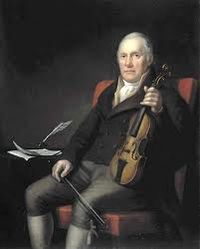Biography:William Marshall
William Marshall
| |
|---|---|
| Given name: | William |
| Middle name: | |
| Family name: | Marshall |
| Place of birth: | Fochabers |
| Place of death: | Craigellachie Bridge |
| Year of birth: | 1748 |
| Year of death: | 1833 |
| Profile: | Musician |
| Source of information: | |
Biographical notes
William Marshall (1748-1833) was born in the old village of Fochabers, then in Banffshire, in rather poor circumstances but rose through his lifetime to become a successful and respected man with numerous accomplishments, musical and non-musical to his credit. At the age of twelve he entered the service of the local nobleman, the Marquis of Huntley and later Duke of Gordon, and his wife Jane Maxwell, whom he loyally served for much of his life. Marshall’s innate intelligence and native physical strength served him well, coupled with discipline and a curiosity for the world around him, and he strove to master the basics of astronomy, mechanics, horology, architecture and falconry, taking advantage of the opportunities for learning he found at Castle Gordon. He was a fine athlete, and applied his mechanical and intellectual skills to his hobby of clock-making, acquiring a reputation for fashioning precision instruments, three of which still survive (including a highly-regarded astronomical clock). He was rewarded with ever-increasing responsibilities, first as butler, then as house steward for the Gordons, a position he held for some thirty years. As steward Marshall had sole responsibility for the household when the family was in London or Edinburgh, and he organized their travel arrangements, while sometimes accompanying them.
It is as a musician and composer that his modern reputation rests on. Marshall had no formal training in music, but none-the-less became a skilled performer and composer of Scottish melodies that are both melodically beautiful while requiring considerable skill to perform. The Duke and Duchess often called upon him to play impromptu for parties and dinner gatherings, which often included dancing as entertainment. He was fond of composing in flat keys as well as the more common ‘fiddle’ keys, and had complete command of the fingerboard—when criticized for the demanding nature of his compositions for fiddlers, he responded that he did not compose for ‘bunglers’. Unfortunately, many of his compositions appeared in the collections of others under different titles, a fact that has led to sometimes bitter accusations of plagiarism against the Gows and other publishers on Marshall’s behalf. It has been pointed out, however, that Marshall’s tunes circulated widely in his lifetime, often long before his own publication of them, and that oral or informal transmission of them may account for title changes. Also, copying on intellectual property was not looked on then as it is in modern times, and laxity in attributions was common, especially given the difficulty in communication of information in the late 18th century.
Marshall married at age twenty-five to one Jane Giles, with whom he had five sons and one daughter. Several of his sons joined the military and one fought a Waterloo. Later in life, in 1790, Marshall left Gordon Castle and first rented a farm in Fochabers, soon moving to a larger one called Keithmore, near Dufftown, by the River Fiddich. He became factor to the Duke of Gordon with the responsibility for overseeing estates in Banff and Aberdeenshire, a post he continued until 1817. Marshall spent the last years of his life in Newfield Cottage, near Craigellachie Bridge, dying there in 1833. He is buried in Bellie Churchyard, near his birthplace of Fochabers.
